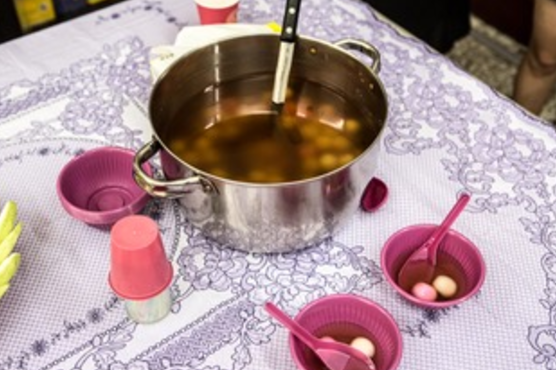Sue Chan is the mastermind behind Care of Chan, a hospitality communications and production agency based in New York (though she's a Californian by way of Taiwan). She talked to us about her family's wedding traditions.My grandma cooked my parents' wedding dinner. Both of my parents came from humble backgrounds, and when they got married, they opted out of a big wedding. They got married at city hall, then went home, where my grandma made this big feast.
Advertisement
Twenty or 30 years later, my cousins started having these epic wedding banquets, one of which happened a couple of summers ago.Everything leading up to the banquet is very elaborate. The couple takes these wedding photos—they have you do all sorts of silly couple-y things, multiple outfits, lots of cartoon images are printed on the photos… it's a big to-do. On the day of the wedding, the groom has to go through a series of tests with the bride's friends and family—like writing poems about why he loves her, or singing while doing pushups. After that, all of the little kids in the family might jump on the bride and groom's bed—if you have little kids jumping on a bed, it blesses the bed with fertility.
Then everyone moves as a pack to dinner. It's either at a big restaurant or a banquet hall—places that are meant to host these weddings. It's just a sea of people, and hundreds of tables. It's crazy. I moved around a lot when I was younger, and I was kind of always in a foreign place, so there was something really nice about coming together with your family.
The energy throughout the meal is definitely rambunctious. There's like a thousand people, so lots of business deals are happening, lots of frenemies are seeing each other. Since the entire family is invited, there's always drama. Sometimes it's a matter of who's seated at which table, and it becomes a whole to-do. Those kinds of things really matter in Chinese culture, because respect is such a big thing—if you feel disrespected, there are going to be problems.Since the entire family is invited, there's always drama.
Advertisement
Once the meal gets going, all of the food is served family-style, at big round tables with lazy Susans, and there's usually ten to twelve courses. There are a few things that are definitely always on the menu—Hainanese chicken, roast pork, and jellyfish are the three main things that my family will always have. The jellyfish is always my favorite, served cold with red vinegar. It's tangy and sweet and so good.Cold cuts and shark fin soup are at pretty much every wedding banquet. Shark fin soup definitely weirded me out as a kid. As an adult, I think it's delicious—I feel bad saying that because it's illegal.I definitely had a picky phase in my childhood, anything that was gelatinous and weird like jellyfish or abalone—I'd refuse to eat it. I think it was the influence of my friends—a lot of Taiwanese food is weird to American kids. When I moved to America, I definitely tried to assimilate to American culture, and that was one of the big reasons why I turned away from that kind of food. But, now that I'm older, I'm like, "no, this stuff is amazing."MAKE THIS: Ain't No Party Like A Taiwanese Hot Pot PartyAt the wedding there's also a Peking duck, with buns, then you might have some lobster, and usually a whole fish, cooked very simply with ginger and scallions, to represent abundance. There's always a noodle dish, since noodles represent longevity in Chinese culture, and they'll always have some veggies, like bok choy with sea cucumber and some kind of hoisin-like sauce. With that is usually braised abalone—abalone is definitely served on Chinese restaurant menus, but that, along with honey walnut shrimp, is something I only ever have at weddings.
Advertisement
Walnut shrimp is just incredible. First of all, it's fried shrimp, these gigantic prawns with the shells off, dipped in a batter, then deep-fried, then doused in this sweet kind of Kewpie-like mayo, and served with candied walnuts. As a kid, it's like candy—this savory, sweet candy. The prawns are so big, and the walnuts are kept whole… there's just something so luxurious about it. They look like these jewels on a plate. That's one of my favorite foods in the entire world, the honey walnut shrimp. It's literally at every single wedding I've been to.If there's food on the table once everyone finishes, the venue will bring out a bunch of to-go containers. It's very Chinese to not waste food, so taking home leftovers is completely encouraged—that might even be the best part of it all.The whole event is a reminder that this is very much my culture, and these are my people. There's a comfort to being around that. It's something that maybe I wasn't experiencing at school as a kid, because I was one of the only Asians in my friend group—I essentially thought I was white. I turned my nose up at a lot of Asian culture, including Asian food… But going to these weddings was a way for me to experience my culture in a really comfortable, safe environment. That's what makes those dishes so memorable—having this food is one of the few times that I would be surrounded by relatives and friends that were of the same background, coming together over a meal that has a lot of ritual and circumstance around it. It's a celebration of love, and these people, and bringing family and friends together, whether you like them or not.

The very last dish served is red bean soup with glutinous rice balls. I had it for the first time as a kid, at one of these big wedding banquets, and I fell in love—it symbolizes the sweetness of life.